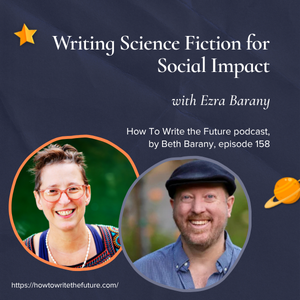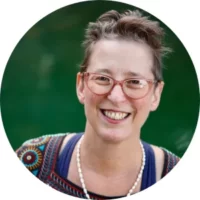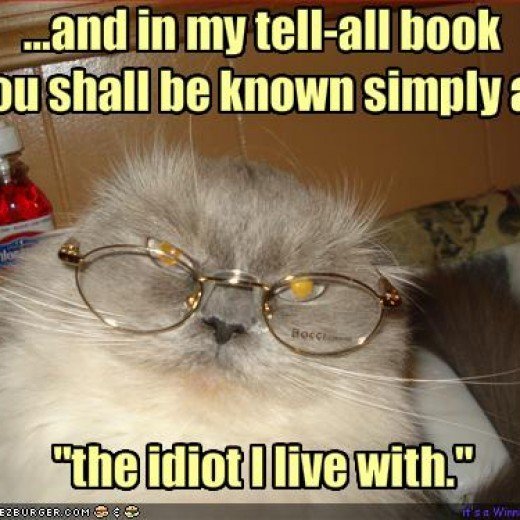Writing Science Fiction for Social Impact
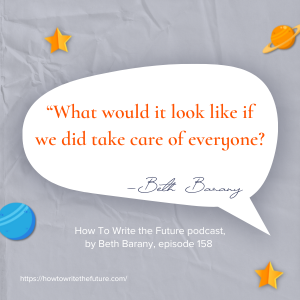
Writing Science Fiction for Social Impact – How To Write the Future podcast, episode 158
***
“What would it look like if we did take care of everyone?” – Beth Barany
In this episode of “How To Write the Future” podcast, authors and writing teachers, Beth Barany and her husband Ezra Barany, explore how speculative fiction can highlight social issues. They discuss strategies for crafting compelling stories that inspire social change without being preachy, while emphasizing the importance of world-building and creating positive narratives.
Platforms the podcast is available on: Apple Podcasts | Buzzsprout | Spotify | Amazon Music| YouTube
RESOURCES
Support our work for creatives! Buy me a coffee: https://ko-fi.com/bethbarany
GET HELP WITH YOUR WORLD BUILDING – START HERE
Free World Building Workbook for Fiction Writers: https://writersfunzone.com/blog/world-building-resources/
Sign up for the 30-minute Story Success Clinic with Beth Barany: https://writersfunzone.com/blog/story-success-clinic/
Get support for your fiction writing by a novelist and writing teacher and coach. Schedule an exploratory call here and see if Beth can support you today: https://writersfunzone.com/blog/discovery-call/
About the How To Write the Future podcast
The How To Write The Future podcast is for science fiction and fantasy writers who want to write positive futures and successfully bring those stories out into the marketplace. Hosted by Beth Barany, science fiction novelist and creativity coach for writers. We cover tips for fiction writers.This podcast is for readers too if you’re at all curious about the future of humanity.
This podcast is for you if you have questions like:
– How do I create a believable world for my science fiction story?
– How do I figure out what’s not working if my story feels flat?
– How do I make my story more interesting and alive?
This podcast is for readers, too, if you’re at all curious about the future of humanity.
ABOUT EZRA BARANY
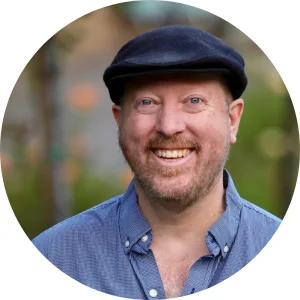 Ezra Barany loves riveting readers with thrillers, but by order of the Department of Motor Vehicles he must place a warning on every book cover, “Do not read while driving.” His first two books in The Torah Codes series were award-winning international bestsellers. The second two books in the 4-book series wowed readers too! In his free time, he has eye-opening discussions on the art of writing novels with his wife and book coach Beth Barany. A high school physics teacher, Ezra lives in Oakland with his beloved wife and two cats working on the next book in The Torah Codes series. Ezra, not the cats. For a free short story in The Torah Codes series, “The Mourner’s Kaddish,” do please go to http://www.thetorahcodes.com/.
Ezra Barany loves riveting readers with thrillers, but by order of the Department of Motor Vehicles he must place a warning on every book cover, “Do not read while driving.” His first two books in The Torah Codes series were award-winning international bestsellers. The second two books in the 4-book series wowed readers too! In his free time, he has eye-opening discussions on the art of writing novels with his wife and book coach Beth Barany. A high school physics teacher, Ezra lives in Oakland with his beloved wife and two cats working on the next book in The Torah Codes series. Ezra, not the cats. For a free short story in The Torah Codes series, “The Mourner’s Kaddish,” do please go to http://www.thetorahcodes.com/.
Transcript for episode 158 Writing Science Fiction for Social Impact
Introduction and Hosts
BETH BARANY: Hey everyone. Beth Barany here for How to Write The Future Podcast. I am your host, and today with me I have my husband, Ezra Barany. We are both writers. I am a creativity coach for writers and an award-winning novelist in science fiction and fantasy. And I help writers go from seedling of an idea all the way to publication and my specialty is science fiction and fantasy.
[00:25] The Power of Speculative Fiction
BETH BARANY: Today we’re gonna talk about writing speculative fiction for social change. Ezra’s got some great questions for me, and if you have a question, be sure to ask it in the comments at how to write the future.com or tag me on social media.
If you would like more support around your world building for your science fiction or fantasy novel, be sure to stay to the end and I’ll tell you how to get some more help.
All right. That’s it. Yeah. Take it away Ezra.
EZRA BARANY: Great. So you know how like most politicians, they get up out of bed and they say, today, I want to emulate Wally because that’s, that’s who they want to be.
[01:09] Influence of Science Fiction on Society
EZRA BARANY: How can these science fiction and fantasy narratives rewrite, effectively influence policy makers and social movements?
BETH BARANY: Like Wally? like Wally? Uh, I, I don’t, I don’t know if the message got across exactly. I honestly don’t know except only in retrospect do we see science fiction and fantasy stories, especially science fiction, having an impact. And Star Trek. Star Trek’s the best example.
EZRA BARANY: Yeah.
BETH BARANY: People who watch Star Trek as children and then later on became scientists and tech folks. And, they talk about how, what was shown on the screen there drove them. They’re like, ah, I wanna make a tri-quarter. Oh my gosh, transporter. How could that work? Warp speed. How could that work? We don’t know when we create it.
When they were creating the show, they were saying, let’s change society. Let’s make a Western in space. Yeah.
EZRA BARANY: Great. That actually does lead into the next question.
[02:08] Using Speculative Fiction to Address Social Issues
EZRA BARANY: How can writers effectively use speculative fiction to highlight current social issues?
BETH BARANY: Yes.
EZRA BARANY: Because what you were talking about was more tech stuff.
BETH BARANY: Yeah.
EZRA BARANY: But now talking about social issues.
BETH BARANY: Yeah. Oh my gosh.
EZRA BARANY: Current ones.
BETH BARANY: Current. Yeah. Science fiction is great for this. In fact, I would say that science fiction is a wonderful lens to use to highlight social issues.
And coming back to Star Trek, just ’cause it’s so handy, you know there’s an interracial kiss in the story. We have a black woman played by Nichelle, Nichelle Nichols. She is not a maid or a singer or someone’s girlfriend. She has a full on role in the show.
So the values of the creator, Gene Roddenberry created Star Trek and many people have taken those ideas and brought them forward into the current franchise. So, he had values where all people are included, all people have value. Let’s put people of, all kinds of people, so you have characters who weren’t being portrayed in the media as having full roles with interesting things to do and say, and had an active role in the plot. And here Gene Roddenberry put them in these active roles.
That’s so awesome.
EZRA BARANY: Yeah.
BETH BARANY: So.
EZRA BARANY: Well there was one episode where there are two people, so there’s one whose on right side of their face was white, their left side of the face was black and they were calling the other people lower class or not worthy because they were black on the right hand side and white on the left hand side.
And it really brought out the social justice issue of the time.
BETH BARANY: Yeah, absolutely. And, one of Elizabeth Moon’s books has the technology of longevity, and I’m actually playing with this as well, in my upcoming story. But what happens when you have a society where people can live longer and longer, and so people are staying in power who are older and older. That creates a problem for the younger generation. When do they get to take the reins of power? And now you’ve got some older ideas, enmeshed ideas that don’t get to cycle out and no room for new ideas, new people, and new ideas. Elizabeth Moon is a contemporary writer and she’s been writing about these, one of those, that issue, I think those books came out in the eighties.
We still have that problem, right? Of older leaders in the world not making room for new, younger generation. And I know you wrote a story about a society where everyone was expected to wear beige clothing and then one woman wanted to express her individuality by painting and bringing in bright colors and how that was…
EZRA BARANY: Taboo.
BETH BARANY: That was taboo. So that’s a great commentary. If everyone is only supposed to be dressing the same, acting the same, then where’s the room for individuality?
[05:01] World Building for Social Change
EZRA BARANY: And that kinda leads into the next question, which is how does world building contribute to drive social change?
BETH BARANY: Huge. There’s a famous book called Utopia, written back in the 16th century, and that really started the movement around people thinking about utopias and writing about them and trying to create them in real life. And this is also a theme that I realized I’m trying to build a utopia on one of my space stations in my current work in progress, the next Janey novel.
And knowing that, it was like, oh, okay, I’m gonna have a builder who had this aspiration, and then we get to see how it plays out. By the time my main character’s there, it’ll be 70 years plus from the origin of that station. So she gets to see, oh, this was built with all these values to have kind of a utopia, but here’s what’s actually working or not working.
So knowing the broader, I guess, worldview of the people who create the societies that you’re building for your story is gonna help you understand, knowing why was a community created and then how, what are the consequences of that in real time for your main character.
EZRA BARANY: Going back to my story, it was all about gender neutrality, and so there were colors that were too feminine and colors that were too masculine. And so they said, you know what? Let’s just everyone wear beige so that everyone’s equal. And this woman just wanted to express herself in her femininity and used colors in her paintings and the like. So that defined the direction of what this character was going through, and the results and challenges of such a world.
BETH BARANY: And that also brought up the social issue of conformity versus non-conformity. Group versus individual. Yeah. Really great topics, and I just wanna say, science fiction is a great place to explore the social issues and to push the boundaries of what we could be.
And I know a lot of people write dystopia. And a lot of people wanna watch dystopia, but my premise is: why don’t we also use our imagination to imagine the better parts of humanity? What would it look like if we did take care of everyone? What would it look like if instead of gender neutrality, what if all flavors could exist? What if,simply put, what if male and female colors, well, that didn’t exist? And people are people.
What are the ramifications and how do people handle that? And of course, you’re gonna still have conflict because I think conflict is just part of life. But science fiction allows us to, especially science fiction, but fantasy can do this too, to explore different dynamics, different power dynamics, different group dynamics, and different ways of parceling out the goods that we all need to survive.
EZRA BARANY: Nice. Last question.
[07:49] Strategies for Non-Preachy Social Messages
EZRA BARANY: So what strategies can writers use to make their social messages resonate without being preachy?
BETH BARANY: Yes. So this is something that you and I have talked about this great technique of thesis, antithesis, synthesis. Maybe in your story you wanna bring in this idea of gender equality.
Let’s just pull something outta the air that is also happening around us. So maybe your main character thinks that the way the genders are treated is just fine, but maybe you have another character in your story who’s advocating for gender equality, that doesn’t quite exist in your story world.
Now you put these two characters together, one who thinks it’s just fine, and the other who’s like advocating for change. You put them together, and you create a reason why they have to be together. Yes. I am thinking of romance. Because this is often done in romance where you create a way that the two love interests have to be together. They have to solve an external problem and in the process learn each other’s perspective, and by the end, maybe they come to a nuanced understanding.
It’s not all black or it’s not all white, but there’s actually a nuanced understanding and that’s what the synthesis is.
You want to give your character a point of view and you want to give characters around them other points of view. And it might not just be two, it might be three or four or five different points of view on the topic. And then you want to make your central challenge in the story deal with that issue so that everyone gets to chime in.
And it’s not a simple issue that’s being dealt with in the story. And that by the end, you have your protagonist, ideally who has gone through some kind of transformation, and also the secondary character, if you are doing a romance, it’s great if both characters get to have a transformation.
So now you’ve taken this idea of the way things should be, and now it’s not the way things should be, it’s a lived experience for your character from A to Z and same for your secondary characters and tertiary characters even. And maybe the society or environment or town. Everybody gets an opportunity to shift and grow and transform in some way.
And now it’s not an idea. It’s a lived experience that has real consequences for your characters and for their surrounds and their environment.
EZRA BARANY: There was one book I wrote that was asking the question that perhaps the main character was wondering, he might have asked himself: What do women want?
And throughout the book there were women of different wants and different goals and different desires. And so at the end he has this conclusion. And originally I had three pages where he reflects on everything he experienced and learned from it, and I realized that was preachy, so I cut it down to just two sentences or three sentences, something like that.
And, I remember getting a review saying, oh, thank goodness you came to this conclusion without just shoving it down readers’ throats. And it just said it simply. yeah, it’s good to..
BETH BARANY: That’s great.
EZRA BARANY: Do it that way.
BETH BARANY: Yeah. So one or two sentences where they realize, oh, I used to think this but now I realize that.Or even just the realization and if it comes out as very natural and in their natural thoughts or in dialogue is actually better, that, that’s so powerful.
EZRA BARANY: That’s great.
BETH BARANY: Yeah. Good, good.
[11:01] Conclusion and Call to Action
BETH BARANY: If you would like more support around writing your speculative fiction, science fiction, or fantasy, or some wonderful mashup of that, and especially help with your world building, then be sure to check out our World Building Workbook for fiction writers. It’s a PDF that will help you work through, it’s a workbook, all the different aspects of your story world. And if you have any questions, be sure to contact me at Beth Barany on any of the social channels or you can write me at how to write the future.com.
You can even leave me a voicemail. Which no one has done yet, so be the first.
EZRA BARANY: This is the finger wagging moment.
BETH BARANY: The finger wagging moment. This is episode 158 and no one has left me a 30 to 60 second voice message. You could be the first.
EZRA BARANY: Yay.
BETH BARANY: Yay. Alright. This has been fun. We’ve done three episodes in this little series. Ezra and I. I’ll have to have him back for another series at some later date, or if you have a special topic for him, we can put him in the hot seat and have him do an episode.
EZRA BARANY: Let me just..
BETH BARANY: Yes.
EZRA BARANY: What can people get? The first person who sends a voice message what’s, what will you commit to right now as a free gift?
BETH BARANY: You can get if you leave me, oh, that’s really great, incentive.
Incentive. If you leave me a voice message through how to write the future.com and you’re the first person you get to have any book of your choice from my catalog.
EZRA BARANY: Sweet
BETH BARANY: Or Ezra’s catalog. And either digital or signed, we will ship it to you ’cause I love to do that.
EZRA BARANY: That’s fun.
BETH BARANY: With a bookmark, ’cause we have bookmarks first.
EZRA BARANY: You’re welcome.
BETH BARANY: You’re welcome. Ezra, oh my God, oh my God. Alright, this episode is long enough. Do you wanna say our line that we say at the end?
EZRA BARANY: Happy birthday.
BETH BARANY: That’s not it.
EZRA BARANY: That’s, that’s, no, you do it because you’re the best.
BETH BARANY: Oh, okay. I’m the best. All right. In honor of Star Trek and something that I say at the end of every episode. Write long and prosper.
Loved this episode? Leave us a review and rating here: https://www.buzzsprout.com/2012061
Need instructions on how to leave a review? Go here.
***
Support our work for creatives: leave a tip: https://ko-fi.com/bethbarany
***
ABOUT BETH BARANY
Beth Barany teaches science fiction and fantasy novelists how to write, edit, and publish their books as a coach, teacher, consultant, and developmental editor. She’s an award-winning fantasy and science fiction novelist and runs the podcast, “How To Write The Future.”
Learn more about Beth Barany at these sites:
Author site / Coaching site / School of Fiction / Writer’s Fun Zone blog
CONNECT
Contact Beth: https://writersfunzone.com/blog/podcast/#tve-jump-185b4422580
Email: beth@bethbarany.com
LinkedIn:https://www.linkedin.com/in/bethbarany/
IG: https://www.instagram.com/bethbarany/
TT: https://www.tiktok.com/@bethbarany/
FB: https://www.facebook.com/bethbarany
X: https://twitter.com/BethBarany
CREDITS
- EDITED WITH DESCRIPT: https://www.descript.com?lmref=_w1WCA (Refer-a-Friend link)
- MUSIC CREDITS : Music from Uppbeat (free for Creators!): https://uppbeat.io/t/soundroll/fuzz-buzz License code: UMMKDRL02DFGKJ0L. “Fuzz buzz” by Soundroll. Commercial license: https://musicvine.com/track/soundroll/fuzz-buzz.
- DISTRIBUTED BY BUZZSPROUT: https://www.buzzsprout.com/?referrer_id=1994465 (Refer-a-Friend link)
- SHOW PRODUCTION BY Beth Barany
- SHOW CO-PRODUCTION + NOTES by Kerry-Ann McDade
c 2025 BETH BARANY
For more “How To Write the Future” episodes, go here.
If you’d like to invite Beth onto your podcast, drop her a note here.
✅ Like the work we do? Tip us! https://ko-fi.com/bethbarany

